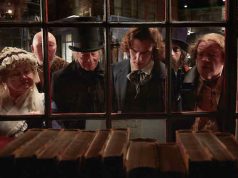Ted Cole is a writer, and he is everything Americans expect their writers to be. He taps away on an old typewriter, drinks heavily, is gregarious when in public but reclusive when trying to write, behaves eccentrically, wears a beard, and is an unrepentant philanderer. Look up “stereotypical American author” in the dictionary, and that’s what you’ll find.
Maybe it’s true. Maybe that’s what all great novelists are like. Ted Cole, the character in “The Door in the Floor,” comes from a book by John Irving, and Irving is obviously a writer, so he presumably knows what writers are like. Maybe Irving himself walks around naked a lot at home and cavorts with local wives when he ventures into town, like Ted Cole does. We’ll have to ask Mrs. Irving.
At any rate, “The Door in the Floor” draws its title from one of Ted’s most popular works, a children’s book rich with symbolism and meaning — perhaps more than the movie has, but never mind that. Ted (Jeff Bridges) is undergoing a rough period this summer, trying to write a new book while dealing with his disintegrating marriage to his wife Marion (Kim Basinger). The faltering is due partly to Ted’s affairs, but it also owes some to the tragic death of the Coles’ teenage sons some time earlier. Their 4-year-old daughter, Ruth (Elle Fanning), might remember Tim and Tom, or she might only remember their photographs: She spends much time in the hallway of the family’s beachside bungalow examining the pictures on the walls and recounting their accompanying stories.
Ted and Marion are trying a separation for the summer, but to keep some consistency in Ruth’s life, they alternate nights sleeping at the bungalow, with whichever parent is off that night sleeping at the apartment in town. In the midst of all this, Ted hires a summer intern, 16-year-old Eddie O’Hare (Jon Foster), a junior at Exeter (where Ted went) and a would-be writer himself. There’s not much work for Eddie to do, as Ted spends much of his time at the home of Evelyn Vaughn (Mimi Rogers), allegedly drawing her but more precisely having sex with her. When Ted does write, he mostly revises, and his revisions are such that it only takes Eddie a minute or two each morning to process them.
This leaves Eddie with enough free time to develop a crush on Mrs. Cole, a mournful, somber, beautiful woman whose seriousness matches Eddie’s. Faster than you can sing “So here’s to you, Mrs. Basinger,” Eddie and Marion are sleeping together.
It’s difficult for that sort of arrangement, and in particular for the conversations that must precede it, to sound believable in movies; I suspect that when such things come to pass in real life, the boys involved can scarcely believe it themselves. But director Tod Williams, who adapted the screenplay from Irving’s novel, deals with it as well as can be expected, and does not overplay the sentiments. (Eddie and Marion’s initial encounters are decidedly, er, unromantic.)
Williams, whose only previous credit is the little-seen but well-received “The Adventures of Sebastian Cole” (1998), directs the film with confidence, finding humor in unexpected places, and often very much of it; the film seems to get funnier as it goes. Jeff Bridges, in particular, would appear to be having the time of his life playing a cad, even as Ted’s devil-may-care attitude clearly masks his inner pain.
And apart from the humor, the film has a sense of loveliness about it: the wistfulness of the ocean, the little girl’s poignant memories, Eddie’s coming-of-age puppy love (played with sensitivity beyond his years by Jon Foster) — the film is sweet, and nice, and very sad, but also very refreshing.
B+ (1 hr., 51 min.; )




